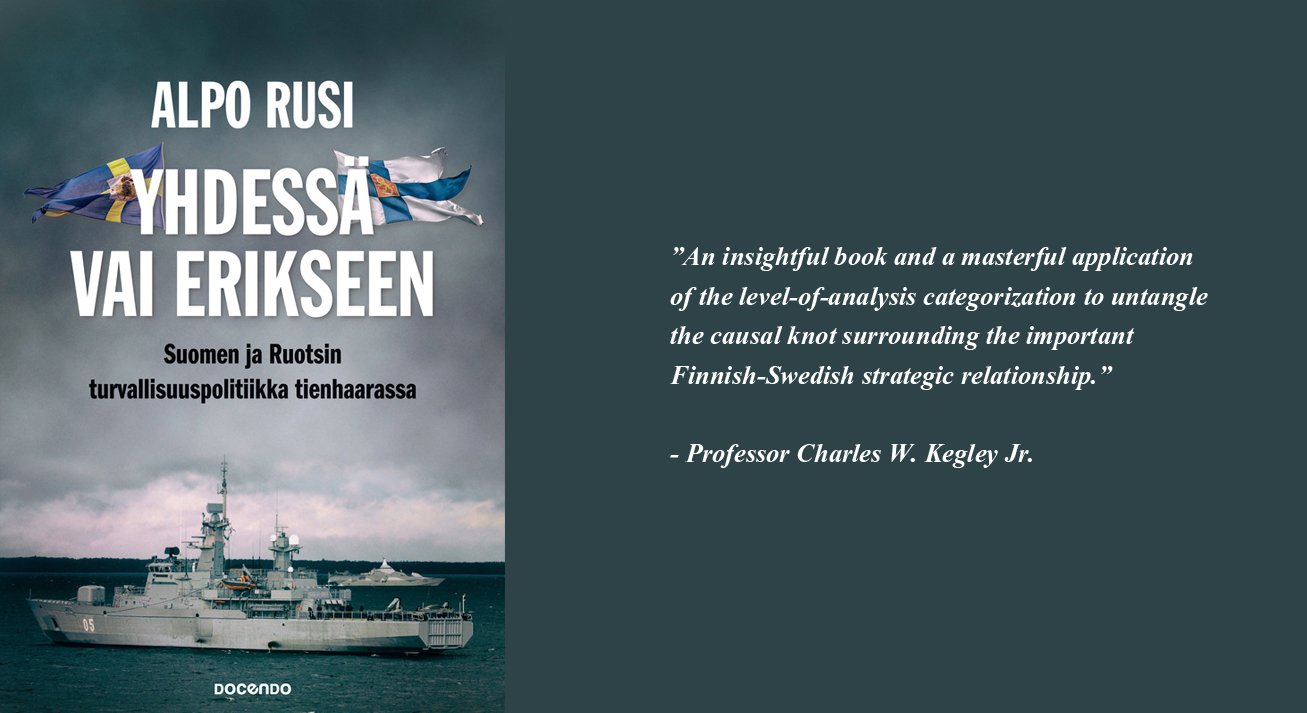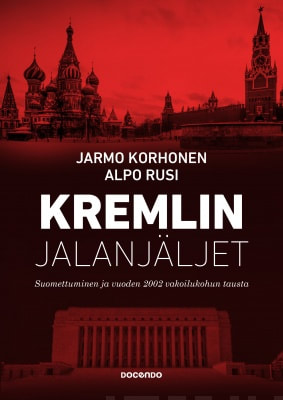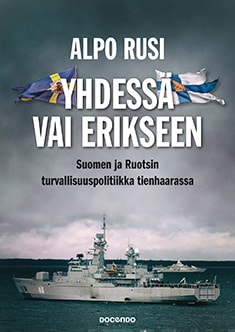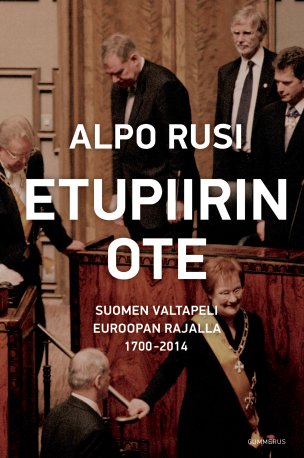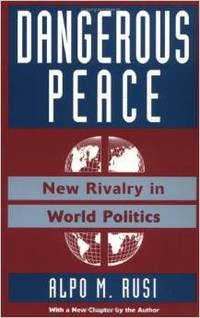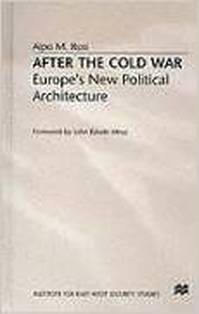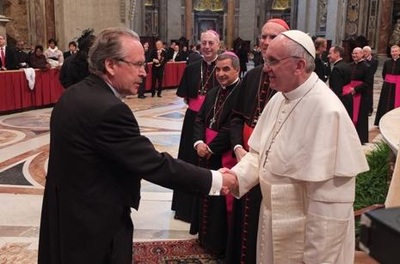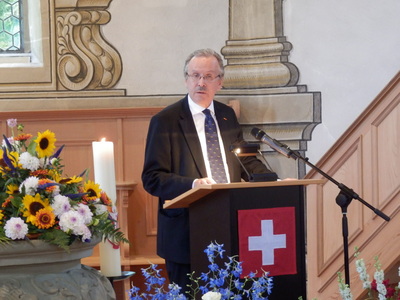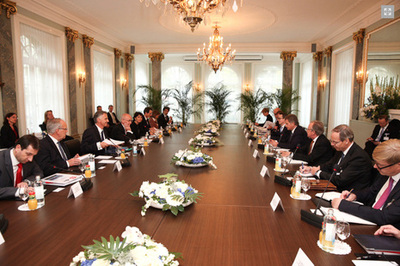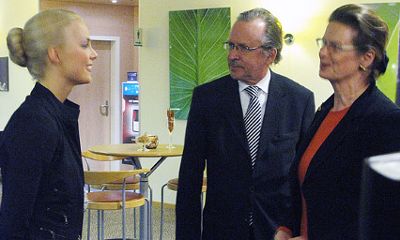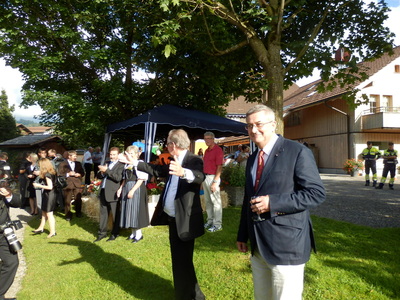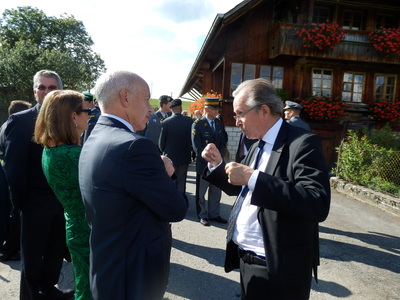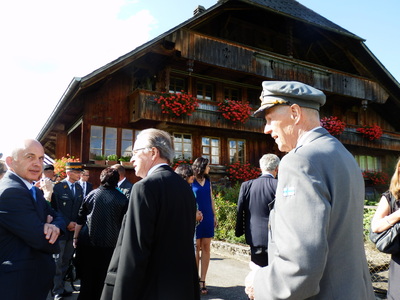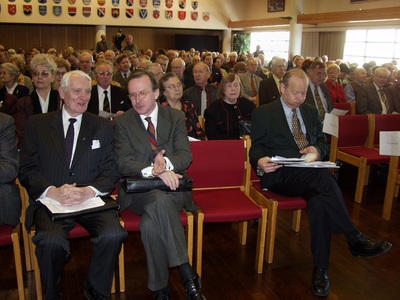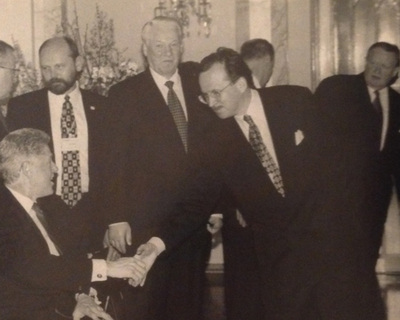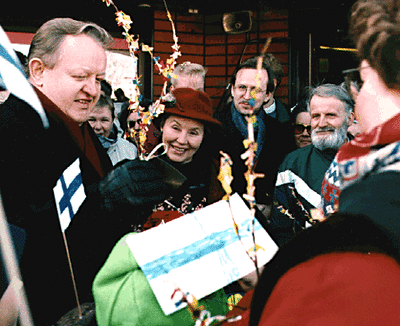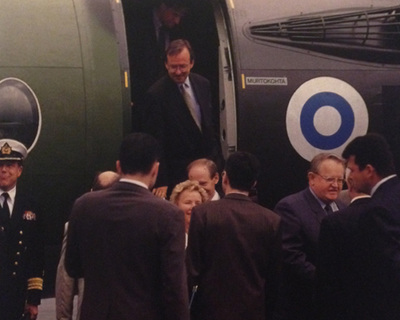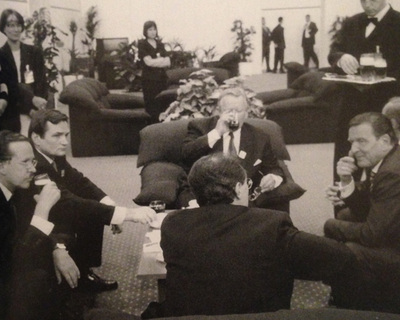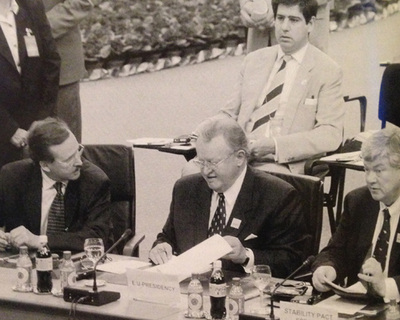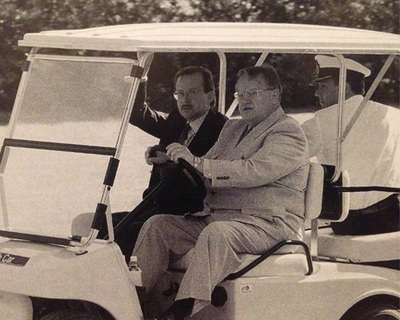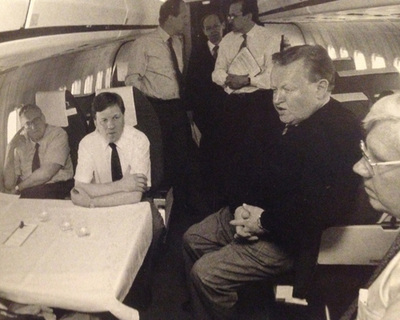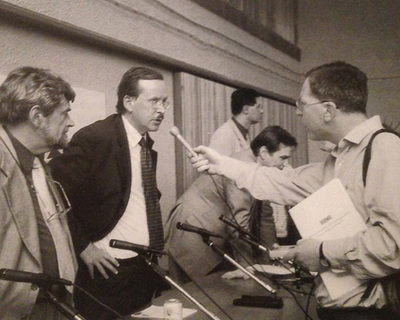OFFICE OF PROFESSOR ALPO RUSI
Dr - Ambassador - Former Advisor of President of Finland - Professor - Author - Woodrow Wilson Foundation Prize Nominee 1992
|
THE NEW BEST-SELLING BOOK
“The Kremlin Card - The KGB’s Political War in Finland 1982-1991” by Alpo Rusi (Docendo, 2022. 368 pages) Published on March 24th, 2022 'The Kremlin Card' was covered by the key media on TV, radio and in the newspapers. The book has been one of the bestselling non-fiction books in Finland in April 2022, staying at number one in that category for several weeks. “Rusi’s text captures the reader’s mind like a detective story. The main goal of the KGB was to keep Finland out of NATO and to resist Finland’s integration to the economic structures of the West and not without results. In the 1980s for example, the Finnish political elite became more prone to respecting and following the Soviet interests in world politics. The book describes several cases of this.The KGB both spied and waged information war mainly with “active measures”, that contributed to Finlandization. The network of “home Russians” or KGB agents with cover jobs as diplomats, journalists or trade counsellors and business operatives deeply and broadly penetrated Finnish society, as Rusi reveals based on the archives of the Protection Police” – Markku Salomaa, Adjunct Professor of War History, February 2022 The book (in Finnish) is available to purchase at major bookstores in Finland or directly from the Publisher Docendo. |
Professor Alpo Rusi's Interview For Sky News During The Helsinki Summit 2018
Professor Alpo Rusi's Interview with Business Leader Jari Sarasvuo
ABOUT
Ambassador, Dr Alpo Rusi is the former Advisor of President of Finland Martti Ahtisaari. Dr Rusi served as Finland's Ambassador in Switzerland between 2009-2014, and as Professor of International Relations at the University of Lapland. Ambassador Rusi served multiple times at the United Nations. Lately, as Senior Adviser in the Cabinet Staff of the President of the UN General Assembly.
In the 1980's Ambassador Rusi worked as Visiting Researcher at Columbia University and as Resident Fellow at EastWest Institute in New York. In 1992, Ambassador Rusi was nominated for Woodrow Wilson Foundation Prize. In October 2014, Ambassador Rusi published a book called Etupiirin ote (eng. Sphere of Influence - Power Game of Finland for Survival on the Border of Europe from 1700 to 2014) in Finnish language, which concentrates on Finland's foreign and security policy issues between 1700-2014.
In the 1980's Ambassador Rusi worked as Visiting Researcher at Columbia University and as Resident Fellow at EastWest Institute in New York. In 1992, Ambassador Rusi was nominated for Woodrow Wilson Foundation Prize. In October 2014, Ambassador Rusi published a book called Etupiirin ote (eng. Sphere of Influence - Power Game of Finland for Survival on the Border of Europe from 1700 to 2014) in Finnish language, which concentrates on Finland's foreign and security policy issues between 1700-2014.
CAREER
The Rudolf Holsti Professor of Diplomacy, Vytautas Magnus University, Lithuania, 2017-
Visiting Professor, Vytautas Magnus University, Lithuania, 2016-
Expert, Davis Center for Russian and Eurasian Studies, Harvard University, the United States 2015-
Ambassador of Finland, Bern, Switzerland, 2009-2014
Senior Adviser in the Cabinet Staff of the President of the UN General Assembly, 2007-2009
Roving Ambassador in the Balkans, 2004-2007
Chairman of the Evaluation Committee of the Stability Pact for Western Balkans, 2005-2006
Professor of International Relations, University of Lapland, 2000-2003
Deputy Coordinator of the Stability Pact for Western Balkans, 2000
EU Coordinator for the Sarajevo Summit, 1999
Advisor of President of Finland Martti Ahtisaari, 1994-1999
Ambassador, Ministry for Foreign Affairs, 1993
Minister, West Germany, 1992-1993
Chief of West Office, Ministry for Foreign Affairs, 1991-1992
Resident Fellow, EastWest Institute, New York, the United States, 1988-1989
Visiting Researcher, Columbia University, New York, the United States, 1988-1989
Chief of Planning Department, Ministry for Foreign Affairs, 1987-1990
Counsellor, the United Nations, 1983-1986
Editor in Chief, Lalli Newspaper, 1982
Member of Finland’s OSCE Delegation, Ministry for Foreign Affairs, 1982
First Secretary, Embassy of Finland in Copenhagen, Denmark, 1977-1979
Vice Consular, West Germany, 1975-1977
Maturity Test, Ministry for Foreign Affairs, 1975
Attaché, Embassy of Finland in London, the United Kingdom, 1974
Attaché, Ministry for Foreign Affairs, 1973
Visiting Professor, Vytautas Magnus University, Lithuania, 2016-
Expert, Davis Center for Russian and Eurasian Studies, Harvard University, the United States 2015-
Ambassador of Finland, Bern, Switzerland, 2009-2014
Senior Adviser in the Cabinet Staff of the President of the UN General Assembly, 2007-2009
Roving Ambassador in the Balkans, 2004-2007
Chairman of the Evaluation Committee of the Stability Pact for Western Balkans, 2005-2006
Professor of International Relations, University of Lapland, 2000-2003
Deputy Coordinator of the Stability Pact for Western Balkans, 2000
EU Coordinator for the Sarajevo Summit, 1999
Advisor of President of Finland Martti Ahtisaari, 1994-1999
Ambassador, Ministry for Foreign Affairs, 1993
Minister, West Germany, 1992-1993
Chief of West Office, Ministry for Foreign Affairs, 1991-1992
Resident Fellow, EastWest Institute, New York, the United States, 1988-1989
Visiting Researcher, Columbia University, New York, the United States, 1988-1989
Chief of Planning Department, Ministry for Foreign Affairs, 1987-1990
Counsellor, the United Nations, 1983-1986
Editor in Chief, Lalli Newspaper, 1982
Member of Finland’s OSCE Delegation, Ministry for Foreign Affairs, 1982
First Secretary, Embassy of Finland in Copenhagen, Denmark, 1977-1979
Vice Consular, West Germany, 1975-1977
Maturity Test, Ministry for Foreign Affairs, 1975
Attaché, Embassy of Finland in London, the United Kingdom, 1974
Attaché, Ministry for Foreign Affairs, 1973
EDUCATION
Doctor of Political Science, University of Helsinki, 1982
Licentiate, University of Helsinki, 1979
Master of Political Science, University of Helsinki, 1971
Licentiate, University of Helsinki, 1979
Master of Political Science, University of Helsinki, 1971
BOOKS BY PROFESSOR ALPO RUSI
Kremlin jalanjäljet - Suomettuminen ja vuoden 2002 vakoilukohun tausta (In English: Kreml's Footsteps - Finlandisation and the Brouhaha Behind the 2002 Espionage Investigation)
|
Suomen poliittinen historia saa uutta sisältöä Rusiin kohdistuneen perättömän vakoiluepäilyn ruumiinavauksesta, käytössä uusia lähteitä!
Syksyllä 2002 julkisuuteen vuoti tietoja Suojelupoliisin aloittamasta maanpetostutkinnasta. Televisioruudut täyttyivät Itä-Saksan lipusta ja professori Alpo Rusin kuvasta. Poliittisissa piireissä oli asiasta juoruttu jo kuukausia. Totuus oli hautautua mediakohuun, mikä oli lainvastaisen vuodon tarkoituskin. Kremlin jalanjäljet tekee vakoilukohun ruumiinavauksen. Todistetuista vakoilutapauksista vaiettiin, koska niistä jäljet johtivat Kremliin ja Suomen valtiojohtoon. Saksan tiedustelun vastavakoilu arvioi luottamuksellisesti jo talvella 2003 Alpo Rusiin liitetyn perusteettomaksi osoittautuneen vakoiluepäilyn poliittiseksi ajojahdiksi. Epäillyksi leimattu oli sotkettu Itä-Saksan ulkomaanvakoilun 1969 avaamaan tietolähteeseen, joka ei ollut epäilty. Kuka keksi nimetä Alpo Rusin vakoilijaksi? Ketkä antoivat perättömiä ilmiantoja? Miksi Supon poliittisia motiiveja ei epäilty? Oikeusoppineet ja poliitikot myötäilivät Supoa ja uhkailivat Rusin puolustajia. Vuonna 2009 Helsingin Hovioikeus tuomitsi kuitenkin valtion merkittäviin vahingonkorvauksiin. Martti Ahtisaaren syrjäyttäminen Mäntyniemestä kytkeytyi Kalevi Sorsan menneisyyteen. Hän oli ollut KGB:n ”luottamuksellinen kontakti” vuodesta 1969 ja hävinnyt 1993 SDP:n esivaalissa KGB-yhteyksien paljastumisen takia. Kosto on rikoksen tavallisimpia motiiveja. Kirjaa tehtäessä käytössä on ollut uusia lähteistä, mm. CIA:n salaisia raportteja ja aikalaislausuntoja. Kirjailijat: Alpo Rusi & Jarmo Korhonen Kustantaja: Docendo Sivumäärä: 213 Kovakantinen kirja Saatavuus: Docendon verkkokauppa |
Yhdessä vai erikseen - Suomen ja Ruotsin turvallisuuspolitiikka tienhaarassa (In English: Together or Separately - Finland's and Sweden's Security Policy at the Crossroads)
|
Suomen ja Ruotsin välillä on satoja vuosia kestänyt keskinäisriippuvuus. Välillä maat muodostivat jopa ”yhteisvallan”. Ruotsin 1600-luvulle ajoittuvaa suurvaltakautta kuvataan Suomen ja Ruotsin yhteiseksi saavutukseksi. Myöhemmin 1700-luvulla geopolitiikka – Venäjän ”turvallisuusintressi” tai paremminkin imperiaalinen laajentumishalu – rapautti yhteisvallan perustukset ja johti 1809 Suomen valtiolliseen eroon Ruotsista.
Kylmän sodan päättymiseen liittyi odotus, että geopolitiikka ei enää määräisi valtioiden suhteista. Sotilaallinen varautuminen menetti samalla merkitystään. Se pyrittiin korvaamaan yhteistyöllä. Suomi ja Ruotsi lähentyivät toisiaan EU-jäsenyyden myötä eivätkä suunnitelleet keskinäisen sotilaallisen yhteistyön syventämistä. Euroopan yhteistyövarainen turvallisuusjärjestelmä osoittautui kuitenkin myöhemmin illuusioksi. Geopolitiikan paluu yllätti Itämeren alueen liittoutumattomat maat, kun Venäjä valloitti talvella 2014 Krimin niemimaan. Baltian maat eivät olleet ottaneet riskiä vaan olivat liittyneet Natoon 2004. Tapahtunut käänne osoitti etenkin Ruotsille, että sen 2000-luvulla tekemät puolustuksen ohentamisratkaisut olivat perustuneet arvioon, että sota ei enää ollut mahdollinen Euroopassa. Suomessa oli torjuttu keskustelu Nato-jäsenyydestä, mikä oli seurausta ylioptimistisista Venäjän kehitysarvioista, mutta myös historian tulkinnoista. Suomi ja Ruotsi joutuvat tekemään lopulta valinnan sotilaallisen liittoutumisen ja puskurivaltioksi jäämisen välillä. Molemmissa tapauksissa ratkaisu sisältää riskejä. Kummatkin maat vastustivat jopa EU:n sotilaallista vahvistamista. Nyt niiden on pohdittava keskinäistä sotilaallista ”liittoutumista”, mutta yhtä lailla arvioitava liittymistä puolustusliitto Natoon. Samalla nousee esille kysymys: yhdessä vai erikseen? Kirjoittaja: Alpo Rusi Kustantaja: Docendo Sivumäärä: 217 Julkaisuvuosi 2016 Kovakantinen kirja Saatavuus: Docendon verkkokauppa |
Etupiirin ote - Suomen valtapeli Euroopan rajalla 1700-2014 - (In English: Sphere of Influence - Finland's Power Game at the Borders of Europe 1700-2014)
|
”Suomen valtioentiteetti on ollut runsaat 300 vuotta euraasialaisen suurvallan etu- ja vaikutuspiirissä. Tämä on seurausta maantieteestä, kansainvälisen järjestelmän shokeista yhtä paljon kuin historiastakin, mutta myös omista valinnoistamme.”
Presidentin neuvonantaja, tutkija ja kirjailija, VTT Alpo Rusi on nähnyt aitiopaikalta lähihistorian merkittävät käänteet. Tässä kirjassa hän kuvaa Suomen asemaa läntisten ja itäisten mahtien rajamaana alkaen Narvan taistelusta, ohi autonomian ajan ja Neuvostoliiton, kohti vuoden 2014 aikana eskaloitunutta lähialuekriisiä. Suomi otti 1990-luvulla vahvan roolin osana Euroopan unionia ja Balkanin kriisin ratkaisuja. Maailman turvallisuusrakenteiden ison kuvan muuttuessa 2000-luvun alusta lähtien Suomen ulkopoliittinen johtojärjestys alkoi hajota ja yhteisten kansallisten tavoitteiden luominen vaikeutua. Näkijä, kokija ja tekijä analysoi Suomen ulko- ja turvallisuuspolitiikkaa eikä kaihda paljastaa lähihistorian salattujakaan taustoja. Hän tarjoaa myös näkemyksen, mitä Suomen tulisi tehdä. Historia opettaa, että Suomen tulee hoitaa viisaasti suhdettaan idän naapurin kanssa, mutta olosuhteiden muuttuessa ei patenttiratkaisuja ole aina tarjolla. Kirjoittaja: Alpo Rusi Kustantaja: Gummerus Sivumäärä: 411 Kovakantinen kirja Kovakantisen saatavuus: Adlibris E-kirjan saatavuus: Elisa Kirja |
A Dangerous Peace: New Rivalry in World Politics (1997) - Alpo Rusi
|
Alpo Rusi provides a broad vision of the strategic landscape for the coming century, warning against dangers inherent in the emerging world order. He predicts a more complexand potentially hostilemultipolar system based on four or five rival trading blocs. Despite the centrality of trade rivalries, the role of military force will not vanish. Although he considers superpower conflict unlikely, he expects that lower-level conflicts will become more prevalent.
Consequently, Rusi believes that the trading blocs will have to actively pursue security arrangements that will safeguard the traditional role of the nation-state. According to Rusi, these trading blocs will develop new political or geopolitical interests. For example, the European bloc will extract fossil fuels from the former Soviet Union instead of the Middle East, thereby changing the existing global trade system. Each bloc will have certain internal problemsthe Europeans will be linked to the unstable successors to the Soviet Union, the East Asian Bloc will have to contemplate whether Chinas economic growth and geopolitical expansions will create a new bipolar world in the early twenty-first century, and the Pan-American bloc will struggle with continuing political and economic instability in South and Central America.Finally, Rusi warns that it is crucial for the European and Pan-American blocs to build upon the traditional Euro-Atlantic relationship.
|
After the Cold War: Europe's New Political Architecture (1991) - Alpo Rusi
|
This book provides new and exceptional interpretations in regard to the post-World War 2 history of the East-West conflict and calls for interdisciplinary approaches in analyzing international relations. The systematic and political processes are undoing the division of Europe and restoring an 'organically' interdependent continent. The events of 1989 in Eastern Europe are but a harbinger of a new security order in Europe and, for the first time since the Treaty of Westphalia of 1648 Europe tries to look beyond state-centered concepts of security.
|
Full List of Published Books
- Kreml's Footsteps - Finlandization And The Brouhaha Behind The 2002 Espionage Investigation, Docendo, 2017
- Together or Separate - Finland's and Sweden's Security Policy at the Crossroads: Docendo, 2016.
- Sphere of Influence - Finland's Power Game at the Borders of Europe 1700-2014: Gummerus, 2014
- Rusi, Alpo: Tiitinen's List. Stasi's Espionage in Finland 1960–1989. Helsinki: Gummerus, 2011. ISBN 978-951-208-607-8.
- Rusi, Alpo: Overtake by the Left. Struggle of Finland's Foreign Policy Leadership Under the Shadows of the Iron Curtain 1945-1990. Helsinki: Gummerus, 2007. ISBN 978-951-207-484-6.
- Time of the Storms. Jyväskylä: Atena, 2004. ISBN 951-796-369-6.
- Rusi, Alpo & Rehn, Olli: Cold Republic. Helsinki: WSOY, 2003. ISBN 951-028-559-5.
- No Longer a Special Case. Finland's International Place After the Cold War. Porvoo ; Helsinki: WSOY, 2003. ISBN 951-027-404-6.
- Mariankadun puolelta. Helsinki: Otava, 2000. ISBN 951-116-692-1.
- Dangerous Peace. A New Rivalry In World Politics. Boulder, Colo.: Westview Press, 1997. ISBN 081-332-258-8.
- After the Cold War. Europe's New Political Architecture. New York: St. Martin's Press, 1991. ISBN 031-206-114-5.
- Gallup ja kansanvalta. Kokemäki: Satakunnan Painotalo Oy, 1985. ISBN 951-996-763-X.
- Mielikuvituksettoman politiikan kritiikkiä. Kokemäki: Satakunnan Painotalo Oy, 1982. ISBN 951-994-234-3.
- Lehdistösensuuri jatkosodassa. Sanan valvonta sodankäynnin välineenä 1941–1944. Helsinki: Suomen Historiallinen Seura, 1982. ISBN 951-925-436-6.
- Kuisma, Juhani & Rusi, Alpo: Avaus äärikeskustaan. Saarijärvi: Ari-paino, 1980. ISBN 951-992-425-6.

